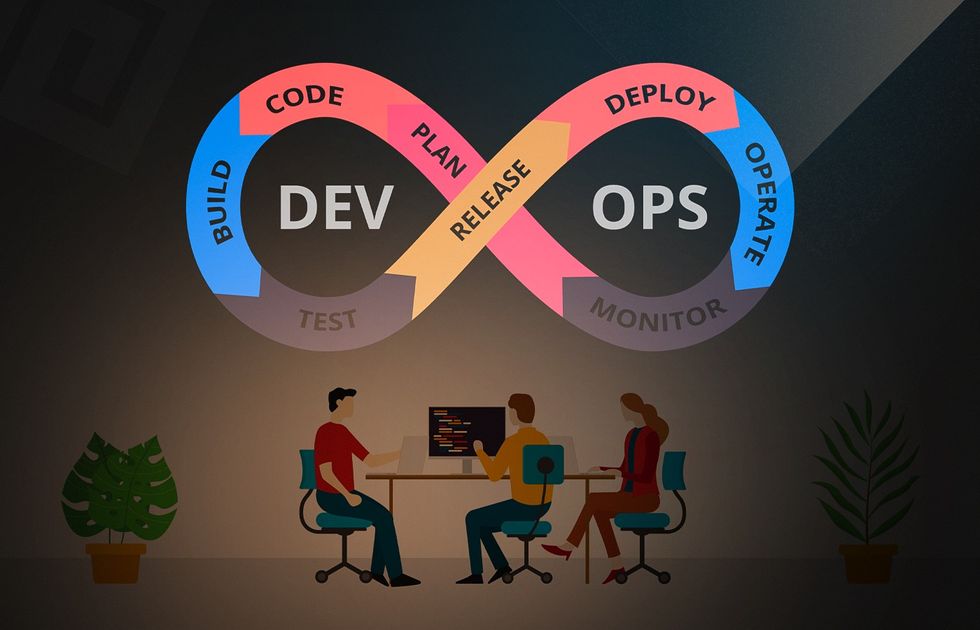You’ve probably heard the term “DevOps” thrown around in tech circles, job postings, and startup pitch decks. But if you’re like most people outside the software world, you might be wondering: what exactly is DevOps, and why does everyone seem so excited about it?
Don’t worry – you’re not alone in feeling confused. DevOps might sound like another piece of tech jargon, but it’s actually a pretty straightforward concept that’s revolutionizing how companies build and deliver software. Let’s break it down in plain English.
The Old Way vs. The New Way
To understand DevOps, we need to go back to how things used to work. Picture this: imagine you’re running a restaurant where the chefs (developers) cook amazing dishes in the kitchen, but they have absolutely no communication with the waitstaff (operations team) who serve the food to customers.
The chefs would spend weeks perfecting a new recipe, then toss it over the wall to the waitstaff with a note saying “good luck!” Meanwhile, the waitstaff had no idea how to explain the dish to customers, what ingredients were used, or how to handle special requests. When something went wrong – maybe the dish was too spicy or arrived cold – both teams would point fingers at each other instead of working together to fix the problem.
This is exactly how software development worked for decades. Developers would write code for months, then hand it off to operations teams to deploy and maintain. The two teams barely talked to each other, used different tools, and had completely different goals. Developers wanted to ship new features fast, while operations teams prioritized stability and uptime. The result? Slow releases, frequent bugs, and a lot of frustrated customers.
Enter DevOps: Breaking Down the Walls
DevOps is essentially about tearing down that wall between development and operations. The name itself is a mashup of “Development” and “Operations,” but it represents something much bigger than just combining two departments.
Think of DevOps as getting the restaurant’s chefs and waitstaff to work as one unified team. They plan menus together, taste-test dishes before they go out, and when a customer has a problem, they solve it together in real-time. The result? Better food, happier customers, and a much smoother operation overall.
In the software world, this means developers and operations folks collaborate from day one. They share responsibilities for building, testing, deploying, and maintaining applications. Instead of working in isolation, they’re constantly communicating and working toward the same goals.
The Magic Behind DevOps
DevOps isn’t just about teamwork – though that’s a huge part of it. It also relies on some pretty clever automation and tools that make everything run smoother. Here are the key ingredients:
Automation is Everything: Remember how your smartphone automatically updates apps while you sleep? DevOps applies this same principle to software development. Teams use automation to handle repetitive tasks like testing code, deploying applications, and monitoring systems for problems. This means fewer human errors and much faster delivery times.
Continuous Integration and Deployment: Instead of waiting months to release new features, DevOps teams push out small updates constantly – sometimes multiple times per day. It’s like getting a steady stream of small improvements to your favorite app rather than waiting a year for one massive overhaul.
Monitoring and Feedback: DevOps teams obsessively track how their applications are performing in real-time. They can spot problems before users even notice them and fix issues quickly. It’s like having a team of mechanics constantly checking your car while you’re driving to make sure everything runs perfectly.
Infrastructure as Code: This might sound technical, but it’s actually pretty simple. Instead of manually setting up servers and databases, DevOps teams write code that automatically creates and manages all the infrastructure needed to run applications. It’s like having a recipe that can instantly set up a fully equipped kitchen anywhere in the world.
Why Should You Care?
You might be thinking, “This all sounds great for tech companies, but how does it affect me?” The truth is, DevOps has probably already improved your daily life in ways you don’t even realize.
That banking app that lets you deposit checks by taking a photo? The streaming service that never seems to crash during peak hours? The food delivery app that tracks your order in real-time? These seamless digital experiences are largely possible because of DevOps practices.
Companies using DevOps can respond to customer needs faster, fix problems quicker, and innovate more rapidly. This translates to better products and services for all of us. When Netflix adds a new feature or fixes a bug, they can roll it out to millions of users within hours, not months.
The Human Side of DevOps
While DevOps involves a lot of technology, it’s fundamentally about people and culture. The most successful DevOps transformations happen when organizations embrace collaboration, continuous learning, and shared responsibility.
This means breaking down silos between teams, encouraging experimentation, and treating failures as learning opportunities rather than reasons to assign blame. It’s about creating an environment where everyone feels responsible for the end-user experience, not just their small piece of the puzzle.
Common Myths Debunked
Before we wrap up, let’s address some common misconceptions about DevOps:
Myth: DevOps is just a set of tools. While tools are important, DevOps is primarily about culture and practices. You can’t buy your way to DevOps success with fancy software.
Myth: DevOps means no more operations teams. DevOps doesn’t eliminate operations – it transforms the role. Operations folks become more strategic, focusing on automation, monitoring, and improving systems rather than just keeping the lights on.
Myth: DevOps is only for startups and tech companies. Organizations of all sizes and industries are adopting DevOps practices. Banks, hospitals, retailers, and government agencies are all seeing benefits from DevOps approaches.
Looking Ahead
DevOps continues to evolve as new technologies emerge. Cloud computing, artificial intelligence, and containerization are all shaping the future of how software is built and delivered. But the core principles – collaboration, automation, and continuous improvement – remain constant.
For anyone curious about technology or considering a career change, understanding DevOps is increasingly valuable. These practices are becoming standard across the industry, and the demand for people with DevOps skills continues to grow.
The next time you seamlessly update an app, stream a movie without buffering, or complete an online transaction in seconds, remember that there’s probably a DevOps team behind the scenes making it all possible. They’re the unsung heroes ensuring that our increasingly digital world just works – and works well.
Want to learn more about DevOps? Start by exploring some of the popular tools like Docker, Kubernetes, or Jenkins. Many offer free tutorials and hands-on labs that can give you a taste of what DevOps work actually looks like.

With over 6 years of experience in the blogging world, I specialize in crafting engaging, informative, and SEO-optimized content across various niches including tech, digital trends, and online monetization. I thrive on staying ahead of industry trends, experimenting with new content strategies, and helping others grow their digital presence.



